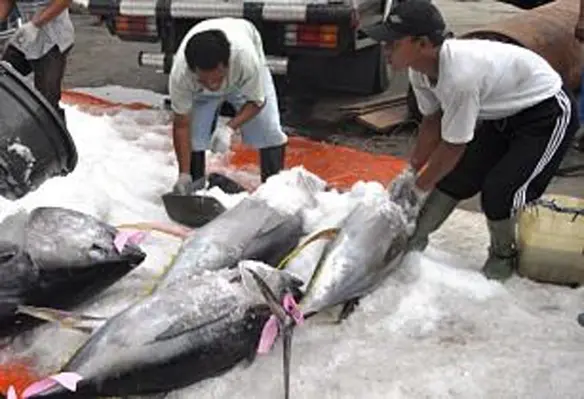The World Wildlife Fund (WWF) has started its own public private partnership programme toward sustainable tuna (PPTST) in the Philippines to prevent the depletion of the tuna stocks in the Coral Triangle
The Coral Triangle is a vast expanse of six million sq km covering the waters of the Philippines, Indonesia, Malaysia, East Timor, Papua New Guinea and the Solomon Islands.
The region generates 40 per cent of the Western Central Pacific’s total tuna catch. Next to Indonesia, the Philippines is Asia’s largest tuna exporter.
In 2010, the Philippines shipped 106,449 metric tonnes of prime-grade yellowfin, big-eye, skipjack and other varieties of tuna to USA, UK and Germany.
About 52 per cent of the country’s fish exports is comprised of various species of tuna caught in Mindoro, Ilocos Norte, Negros and Sarangani.
However, rising demand and decades of intensive, uncontrolled fishing have threatened the country’s tuna stocks.
Joel Palma, conservation programs vice president for the WWF-Philippines, said, “Unless we closely manage and protect remaining populations, our tuna industry might collapse.”
The PPTST was launched in 2011 to improve yellowfin tuna management practices for 5,000 fishermen in 112 tuna fishing villages around the Lagonoy Gulf in Bicol and 28 tuna fishing communities in Occidental Mindoro.
The programme harnesses market power and consumer demand to support sustainable fishing gear and methods, such as artisanal fishing, hand-line reels and circle hooks.
“Hand-line fishing is done aboard small boats. Fishers use single hooks to catch one tuna at a time. This ensures that only mature, high-quality tuna are caught while minimising the problem of bycatch, which is unintentional catching of species, which are usually discarded,” Palma said.
PPTST also works to improve meat-handling practices.
“All fish theoretically start as Grade-A tuna. Poor handling degrades meat quality. A fish caught just three hours before being sold can have Grade-B or Grade-C meat if it is badly bruised. Low-grade tuna sells for about US$1.80 per kilo, while sashimi-grade cuts retail for up to US$6,75 per kilo,” Palma stressed.
Due to current practices, almost 70 per cent of all sold tuna is classified as Grade-C,” said WWF-Philippines PPTST project manager Joann Binondo said.
The European Commission (EC) had recently given the Filipino government a ‘yellow card’ rating for being unable to sufficiently manage illegal, unreported and unregulated (IUU) fishing.
PPTST offers solutions not just to eliminate IUU fishing, but to restore overall fisheries productivity.
Funded by Coop, Bell Seafood, Seafresh and the German Investment and Development Corporation, PPTST involves European seafood companies and their local suppliers, Bureau of Fisheries and Aquatic Resources (BFAR), LGUs in Mindoro and Bicol, the WWF Coral Triangle Program, WWF-Germany and WWF-Philippines.
Binondo added, “The secret is to add more value to tuna, rather than forcing people to fish more. We must secure quality tuna without seriously increasing fishing effort. We aim to reach MSC certification by 2016.
“Our goal is to ensure that our tuna stocks last for many more generations. Through the support of our allies and the hard work of artisanal fishers, PPTST will strike a balance between ecology and the economy.”




